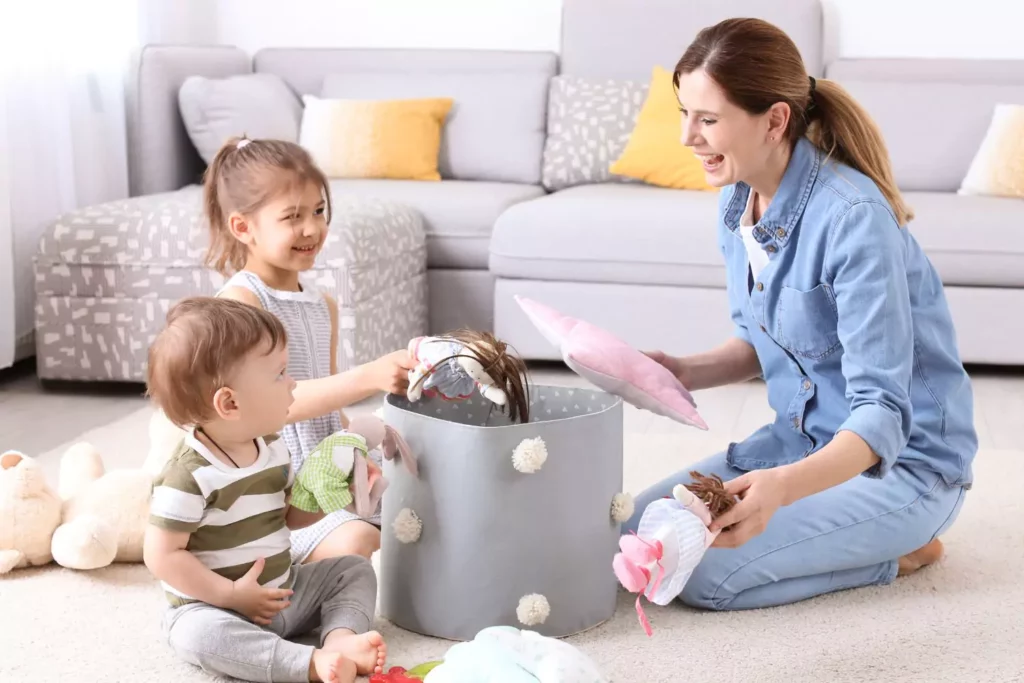
Questions to Prepare Your Kids for Moral Dilemmas
How will your children respond when confronted by a moral dilemma? Prepare them before they are.
July 11, 2023

Encouraging children to pick up their belongings and stow them away properly may be easier than you think.
Estimated reading time: 3 minutes
Where there are kids, there are messes. Fortunately, children can be trained to pick up their possessions and put them away. Here is how some parents have taught their kids to pick up their things:
When I realized my family’s cleaning routine was not working, I
asked my kids to pair up. I gave each pair responsibility for one area of the house. This taught my
younger children how to clean and my older children about leadership and responsibility. I was
surprised at how well it worked. I no longer nag my children to clean because they take initiative
and ownership for their assigned areas.
—Evie
Palmer
Prior to a family outing, I set the timer
for 15 minutes and call for a “quick clean.” Children scramble to
straighten up assigned rooms while I gather belongings scattered around
the rest of the house. When the timer goes off, they put away my pile,
and we head out the door of our clutter-free home! (Fifteen minutes also
works well for yard work.)
—Kristen Erickson
I used a game to teach my kids to pick up their toys, books and personal items. First, they had to collect all the belongings they found scattered throughout the house. I counted the totals. Then they earned a dime for each item once it was put away. To make a contest of it, I timed them or added a bonus for the child who found the most items. This game gave my kids an incentive to clean, and I was able to praise them instead of nagging them to pick up their things.
—Hally Franz
Our household had our own lost and found — but with a twist. Instead of just returning the things my kids left lying around the house, I wanted them to learn to be responsible for keeping track of their belongings. Each night after bedtime, I put any toys, clothes, books, papers, food or other items that were not in their proper place into a large box. If the kids wanted their things back, they had to pay 25 cents for each item. It didn’t take many quarters for them to learn that keeping track of their stuff was worthwhile!
—Cindi Ferrini
My tweens were old enough to help clean up after meals, but dividing the chores and keeping track overwhelmed me. So I came up with an easy-to-follow system. Now when the last person finishes eating, I call everyone to the kitchen. We all clear the table, then I hold craft sticks, with additional cleanup jobs written on the ends, and let each child choose a stick. (The job names are hidden from view.)
I have four children, so each night I offer four jobs that are needed that evening, such as sweeping the floor, wiping down the table, loading the dishwasher or taking out the trash. I’ve also added one rule: Everyone stays in the kitchen until the kitchen is clean. That encourages the kids to pitch in as a team to help each other finish quicker.
—Rachel Schmoyer
Children enjoy blending music and work. While you show them how to do developmentally appropriate chores, use a well-known tune and make up lyrics to fit the melody. For example, if you choose “The Farmer in the Dell,” you can sing words similar to the following:
We’re picking up the blocks.
We’re picking up the blocks.
Hi-ho, the derry-o.
We’re picking up the blocks.
You also can add a child’s name to the song.
Josh picked up a toy.
He’s such a wonderful boy.
Hi-ho, the derry-o.
Cleaning is a joy.
— Sharon Wilkins